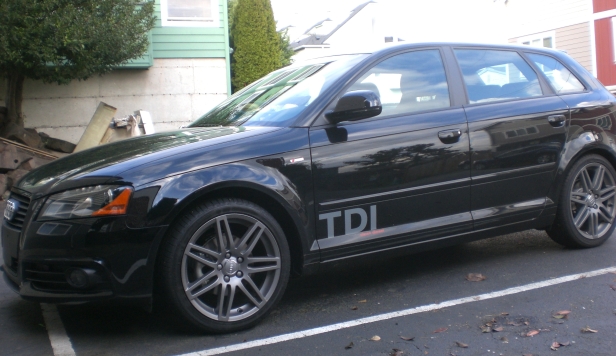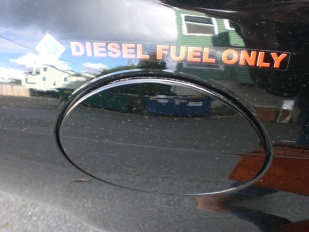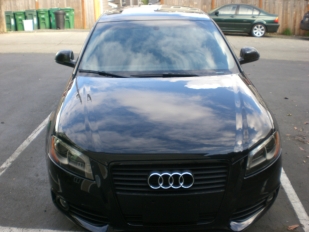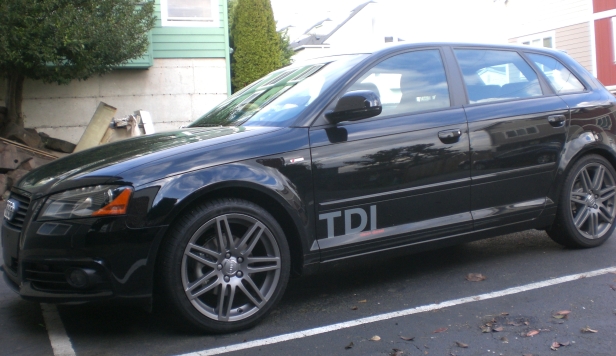 Photo: Ashley BraunI’m a reluctant driver. I’ll be the first to admit it. I do have a Zipcar subscription, mainly for the late-night runs to the airport to pick up my long-distance boyfriend when he sweeps through town. But I haven’t owned a car in nearly three years, instead opting to untangle the labyrinthine routes of Seattle’s city bus system, which often results in embarrassing sprints after the bus as it’s rumbling down the street.
Photo: Ashley BraunI’m a reluctant driver. I’ll be the first to admit it. I do have a Zipcar subscription, mainly for the late-night runs to the airport to pick up my long-distance boyfriend when he sweeps through town. But I haven’t owned a car in nearly three years, instead opting to untangle the labyrinthine routes of Seattle’s city bus system, which often results in embarrassing sprints after the bus as it’s rumbling down the street.
That said, I wasn’t going to turn down the opportunity to test drive the Audi A3 TDI, made famous by the Super Bowl “green police” commercial. (I test-drove the Ford Fusion Hybrid in the wake of its 2010 Car of the Year Award, and after dishing on its green cred, I was approached about road-testing the Audi clean diesel vehicle, winner of the 2010 Green Car of the Year award. I had the Audi for a full week.)
With the za-zoom and plush appeal of a luxury vehicle, the 2010 Audi A3 TDI is definitely a good time on wheels. Driving it made me feel as if I stood out, as if the sleek and powerful — and yes, efficient — diesel car was in a completely different class from all my other greenish driving experiences. But after seven days of driving it, was it a class I wanted to be in?
Win diesel
 Fuel me once, good for you.Photo: Ashley BraunThere’s a lot to be said for the new diesel vehicles. Take fuel economy. Combusting diesel is now 30 percent more efficient than gasoline, so it’s easier to get more oomph and better fuel economy with a diesel engine. After all, if we must combust — another question entirely — why not combust more efficiently? The Audi delivered plenty of get-up-and-go, handled higher speeds around curves with ease, and used its diesel well (EPA 30 mpg city/42 mpg highway). The fuel gauge barely moved in the week I had the car.
Fuel me once, good for you.Photo: Ashley BraunThere’s a lot to be said for the new diesel vehicles. Take fuel economy. Combusting diesel is now 30 percent more efficient than gasoline, so it’s easier to get more oomph and better fuel economy with a diesel engine. After all, if we must combust — another question entirely — why not combust more efficiently? The Audi delivered plenty of get-up-and-go, handled higher speeds around curves with ease, and used its diesel well (EPA 30 mpg city/42 mpg highway). The fuel gauge barely moved in the week I had the car.
Thanks to several advances in technology and policy, new diesels are also much cleaner, quieter, and more powerful, and the A3 TDI doesn’t break from that formula. A 2006 federal mandate limiting sulfur in diesel fuel prompted the transition to Ultra-Low Sulfur Diesel, and presumably, the recent claims of “clean-diesel” cars. Mother Earth News‘ excellent primer on the clean diesel revival explains the technological innovations, if you’re curious. For deeper detail on the Audi A3 TDI, real gearheads should look to the knowledgeable commentary and videos of this exhaustive review from MPG-o-Matic.
The durability of diesel vehicles over their gasoline counterparts — squeezing out up to 300,000 miles when well-maintained — is another big selling point. If the often higher upfront cost of a diesel puts you off — and with a base retail of $29,950, the A3 TDI is no exception — remember that this little Audi will put $1,300 in tax credits back in your pocket as you drive “whee, whee, whee” all the way home.
Environmental psych-out
During the week I was giving the Audi a spin around Seattle, I was acutely aware of my miles per gallon, of course. But to my surprise, I was even more aware of myself — and the reactions of other people to my luxe new ride. I, ever the bus rider, felt like a walking, ahem, driving status symbol for conspicuous albeit kinda green consumption. I’m willing to bet plenty of Seattleites (and many others) would praise such flashy, if modest, environmental choices, but driving more efficient cars, rather than driving less, is one example of how this city isn’t as eco as the world thinks it is.
Now, this Audi did take home the 2010 Green Car of the Year award, and for good reason. However, I felt an inflated sense of self-importance that I’ve never experienced driving a rented-by-the-hour, hybrid Zipcar. Once I became aware of it, I felt a little ashamed and attempted to overcompensate for my green snottiness by becoming a much more passive, and possibly just as annoying, driver.
Turns out this personality change may not be just me. Early research into green psychology from Nina Mazar and Chen-Bo Zhong at the University of Toronto suggests that people behave badly (cheating, stealing, and “less altruistic” actions) after buying green products. However, better behavior results when people are merely “exposed” to green products. In 2007 when CNW Marketing Research, a company that monitors consumer car trends, surveyed Toyota Prius owners about why they bought the archetypal public green purchase, the number one reason was it “makes a statement about me.” The more environmentally altruistic answer, the Prius’ “lower emissions,” came in fifth.
A brand-new study by researcher Vladas Griskevicius at the University of Minnesota confirms these survey results. Griskevicius found people tended to care more about showing off do-goody green purchases in public, but when nobody was looking, they preferred the more luxurious option. This assumes that the more environmental choice is also the “self-sacrificial” one. It also means that appealing to people’s vanity and desire to look like good, planet-friendly citizens may be a more useful mode of persuasion than the green merits themselves. Additionally, the fact that green products often cost more may be one of the reasons certain populations are buying them.
You drive me craaaazy
 Is the green-ness just a cloudy reflection?Photo: Ashley BraunSo, did my week-long “ownership” of a highly visible, clean diesel luxury vehicle cause and subconsciously justify my insufferable eco smugness? Did the people I might have cut off in traffic actually feel more fuzzy-warm thoughts toward humanity than if a Hummer had done it? OK, that last part is just wishful thinking, but the effect on me was real. I liked how my friends ooh-ed and ahh-ed and passers-by did a double-take when I drove up in my swanky green ride. I didn’t like having to go out of my way to find reasons to drive the car more than a mile or two, though it did reinforce that I don’t need to own a car, especially if it means I act like a sanctimonious treehugger and a jerky driver.
Is the green-ness just a cloudy reflection?Photo: Ashley BraunSo, did my week-long “ownership” of a highly visible, clean diesel luxury vehicle cause and subconsciously justify my insufferable eco smugness? Did the people I might have cut off in traffic actually feel more fuzzy-warm thoughts toward humanity than if a Hummer had done it? OK, that last part is just wishful thinking, but the effect on me was real. I liked how my friends ooh-ed and ahh-ed and passers-by did a double-take when I drove up in my swanky green ride. I didn’t like having to go out of my way to find reasons to drive the car more than a mile or two, though it did reinforce that I don’t need to own a car, especially if it means I act like a sanctimonious treehugger and a jerky driver.
Whatever kind of car you’re driving, something funny happens to us when we drive. “We are how we move,” writes Tom Vanderbilt in his book, Traffic: Why We Drive the Way We Do (and What It Says About Us).”Something deeper and more transformative happens when we move from people who walk to people who drive.” Using Walt Disney (and Goofy) as an example, Vanderbilt explains how normally model citizens when afoot transform into “uncontrollable monsters” once behind the wheel.
After this test drive, I’m even more certain I’d rather be one of the people who walk. But if you’re one of the people who drive (and can afford it), this Audi is a pretty good choice.



